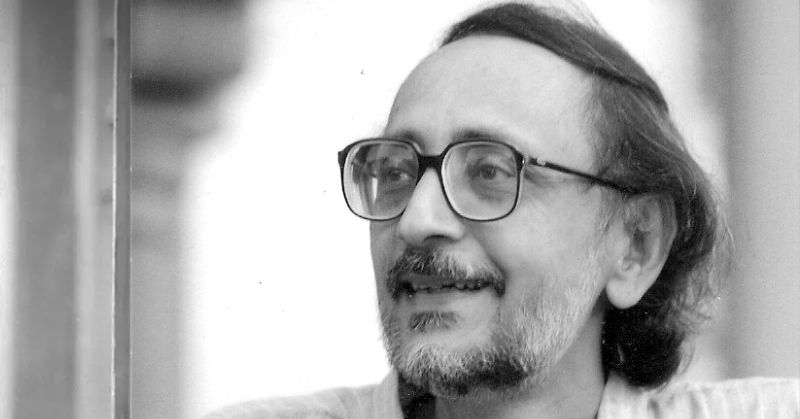Poems ::
Gyanendrapati, Krishna Kalpit & Anchit
Translations: Ojachito
Trilogy of Chetna Pareek Poems:
The three poems translated at this attempt are “Tram mein ek yaad” by Gyanendrapati, “Chetna Pareek ki yaad” by Krishna Kalpit and “Chetna Pareek ki mrityu kamna” by Anchit, are the part of a poetic trilogy on Chetna Pareek, who has become a phenomenon to all poetry lovers, at least, in the region where the poems have been written, read and appreciated in Hindi. To bring up all of them together in their translated form in English is not only aimed at taking them to a greater reach of the audience acquainted with the language but also making available different poetic compositions on beloved Chetna by different poets with varied hues. These poems strikingly offer a spectrum to realize how in each case her memories melt into the cityscapes of Calcutta with a classic tramcar plying in order to signify a lost space, a nothingness, as recurrent haunting imageries.
Another interesting binding feature of all of these three poems is the ‘double movement’ of Chetna, the ‘poetic consciousness’, manifested through scattered, un-linear, unruly, crippling, sometimes even creepy emotions, juggled with words: the simultaneous life and death wishes, the game of mortality and deathlessness, the marination of love with hate, hope with remorse, and success with failure. If any precarity that has made Chetna Pareek immortal in this consciousness is something that invokes a reverie and a frail physicality together, a continuum of tangibility and ghostliness of the existences of the city and the citizens mashed up on one singular mellow yet elegiac track of a soulful music.
The Translator’s Note:
These poems are classic examples of the Freudian “Mystic Writing Pad” as they portray complex palimpsestic images, evoke surreal feelings and narrate aporias of the life-world. As Calcutta appears as an erasure through the apostrophic refrains to the protagonist, Chetna Pareek, as a translator, I got time and again, simultaneously guided and misguided while reading the poems. So, I must admit that whatever I have ended up here with is something that is more than a translation, almost a sort of transcreation. This note is, thus, also an apology to the poets on the question of fidelity; although I believe that this act has broadened the scope of semantic corpus of these poetic compositions at multifarious levels. Having said that I must admit that I have taken liberty to some extent in recreating images and emotions in these translations as they appealed to my own heart and mind. I earnestly hope that therein lies the strength of them in preventing their reification and consequent fetishization, given their contagious popularity.
Another classic strength of these poems is the lucid language which they have been written in. I have realized that the more varied the possibilities concealed in the con/figurative tools used in the poems the simpler the expressions are. At this juncture, once again, I would like to admit that with the variations in the reception of these different feelings, emotions, imageries and metaphors, my language has also been forced to chance its course in some places instead of loyally following the original conduit, which is, however, mythical to me. It is now up to the readers of these transcreations to critique the claims made in this note.
A Memory in a Tram
by Gyanendrapati
How do you do, Chetna Pareek?
Are you still the same as you used to be?
Partly gay
Partly pensive
Sometimes you gazed at stars
At others, the grasses stared at you
Chetna Pareek, how do you look like now?
Do you still write poems?
You must have forgotten me
But, I couldn’t take that test of my memory.
Once more the contours of your body swing before my eyes
As the tram rattles ahead
A silhouette – tender and tiny
Falls upon my weary eyelid
A cloud of reminiscences cuddles me.
How do you do, Chetna Pareek?
Are you still the same you used to be?
Do books still sparkle your eyes?
Do you still take part in plays?
Do you still take rounds of the library?
Do you still chance upon loitering poets like me?
Do you still sing or paint?
Do unnumbered friends you still frequent?
Do kids in your tuitions still be reared?
Do you still make your lovers sport a beard?
Chetna Pareek, are you still playful
Like the tiny sportive ball?
Does your charm still the youth enthral?
The city is still that noisy
The traffic stays standstill everywhere
Crowds wrestle and shove
Futile businesses rule.
Trams stagger as the tube pierces the subway\
Crippled Calcutta still lurches
Along perpetual eternity.
There is still a corner vacant
for a sparrow in these dense woods
An empty stalk sans a tiny bird or
a leaflet vainly broods
The banterous guffaw still a smile lacks
A million of lub-dubs still looks
for the one lost in the shabby shacks.
A voice is still unheard in choral tracks.
There is still a pasture bare
Between your two palms
Where green-blades have grown
Where dew drops make their home
None to have a look nobody to care.
I’ve come to this city once again
I stare at crowds
Wiping my glasses time and again
I write on people, on books,
On buses and trams, on multi-faced crooks,
On disease and sorrow, on merry and laughter, on rewards and losses,
I stare at the doubled crowds
A tiny corner of your stature
Still my vision shrouds.
How do you do, Chetna Pareek?
Why don’t you tell me if you’re still the same?
The Memory of Chetna Pareek
by Krishna Kalpit
1.
I will come back, be sure –
Chetna Pareek,
I am awaiting the end to the war.
Warfare can’t go on for days together
How long can one put on the battle-wear?
On 30th October, I will take the train
Indian Railways will resume their services by then.
You might remember
That we had met in a Calcutta tram
When a bearded poet sacrificed himself
For your insatiable charm.
2.
A poet became immortal writing poems on you
And, you died, Chetna Pareek!
I still recall you –
Your frail body
Your spectacles
Your poetry notebook
And the dust of the town
Wherefrom you moved to Calcutta
Chetna Pareek, let me proclaim you as deathless!
3.
You were older
A lost love
A kiss missed in indecision
I was still the better poet then
That wrote a poem on you, Chetna Pareek!
4.
A poet wrote poems on you
Another just loved you
Yet another poet married you
Who knows poets better than you do, Chetna Pareek!
5.
For the first time
We met in a Calcutta tram
That hit the Bangla poet Jibanananda Das
And killed him.
Are you the death to poets, Chetna Pareek!
Death Wishes of Chetna Pareek
by Anchit
Begone, be driven,
Die out, Chetna Pareek, flee yourself at last.
I swear you, for the sake of
The wintry night within a reverie confined
I swear you, for the sake of
The long window along the old alleys lined.
How long will I keep on coming back to you, Oh! Calcutta?
And, will return without a look at her?
How long will I crave for a hope
From the brazen heart of a blasé lover?
In ponds, fishes still await your glance: eyes wide open
How easily, butterflies, just uncocooned,
Put their faith in you: unshaken.
Who knows how many poets your love
Has finished, Chetna Pareek –
Yet behold, you have remained unfinished in their poems.
How many have gone insane,
How many lovers,
How many gods –
Nobody could simply remain human.
Chetna Pareek, I wanted from you what love may be
In lieu, you’d want poetry out of me.
How incomplete we remained –
Why don’t you die with our imperfection?
Why not be lost in this infatuation?
Chetna Pareek, choose a poem to die in –
Choose with peace my memory to rest in.
***
Ojachito is a nobody. His absence may be felt at: sovantamluk08@gmail.com

